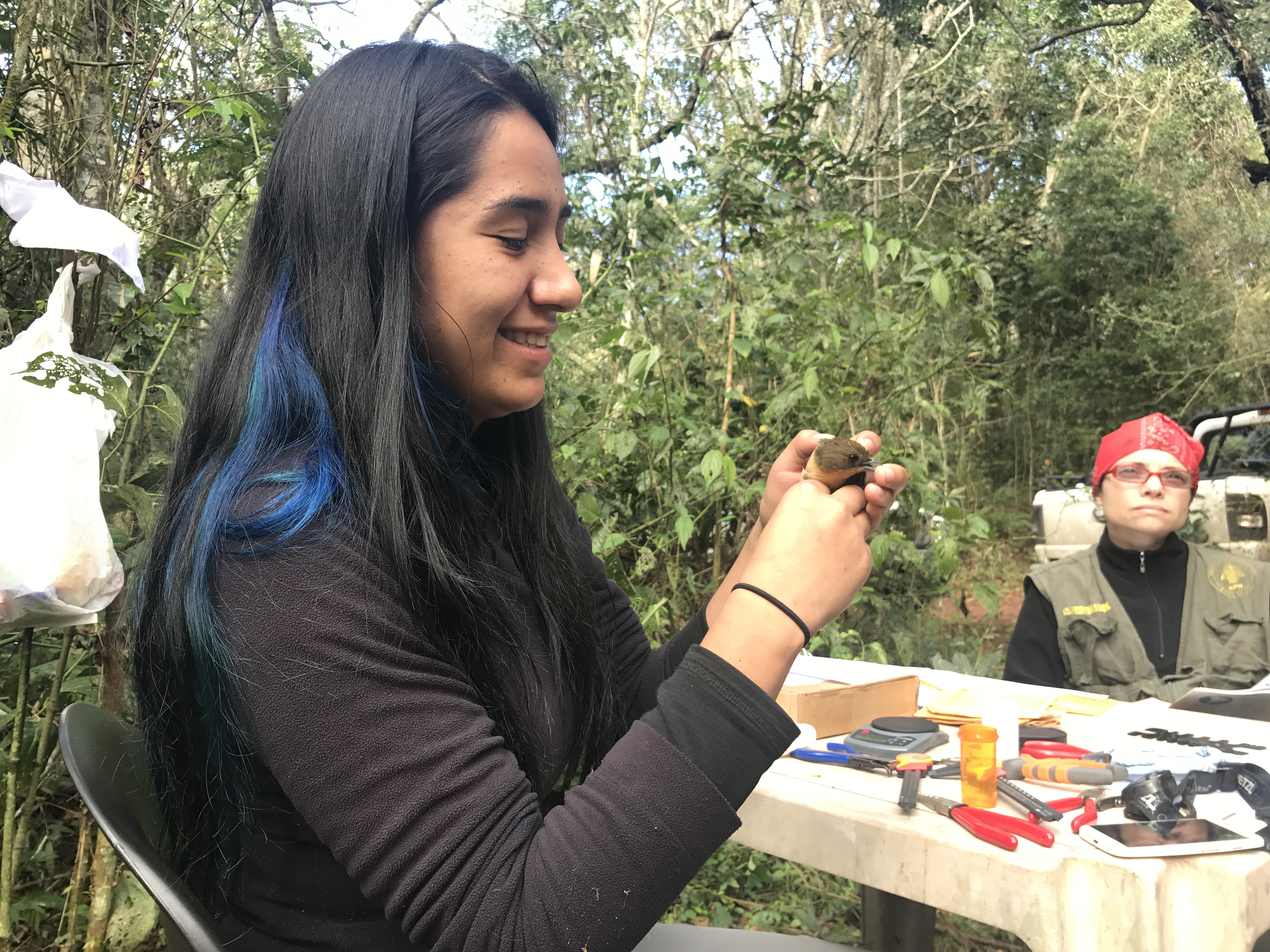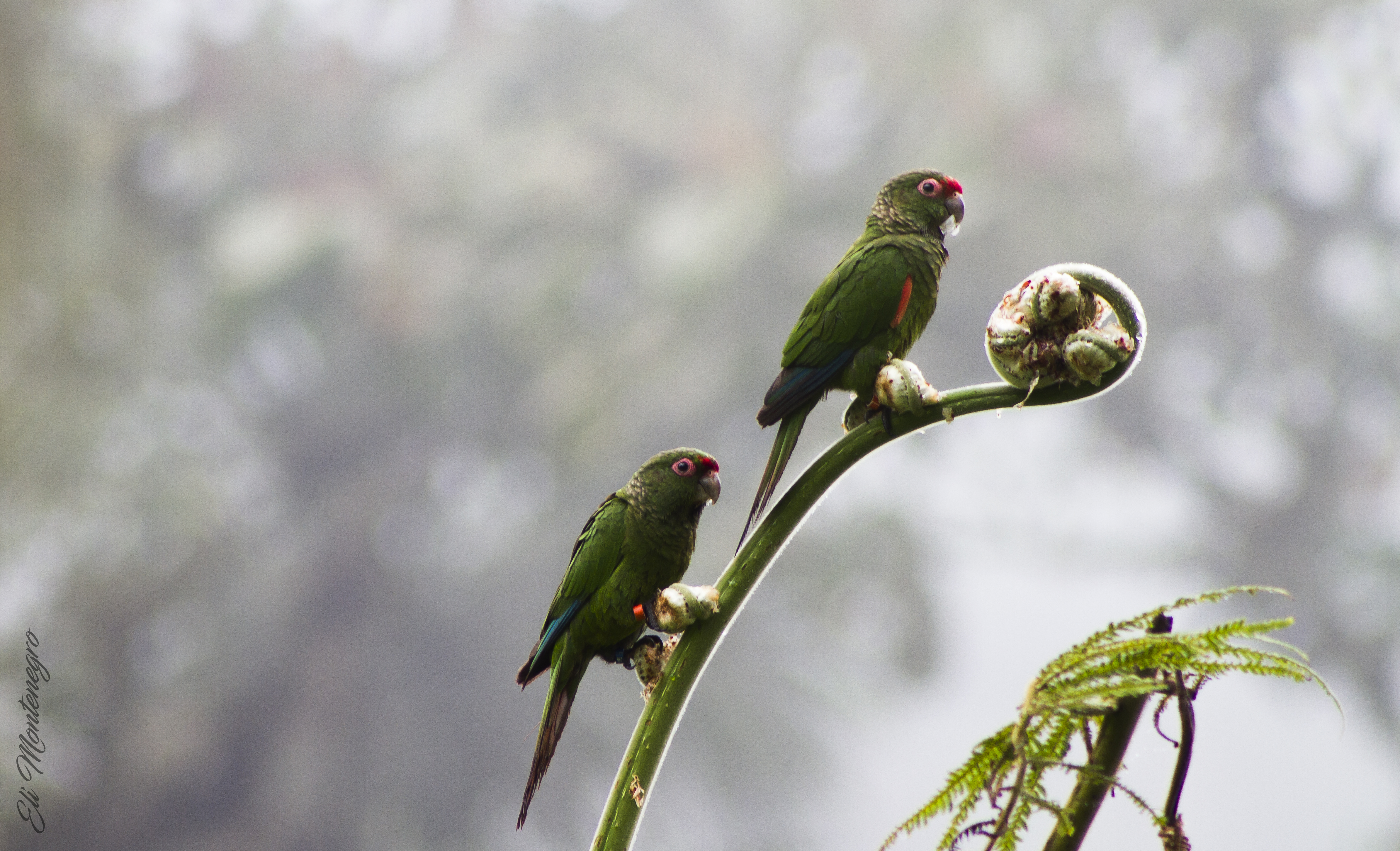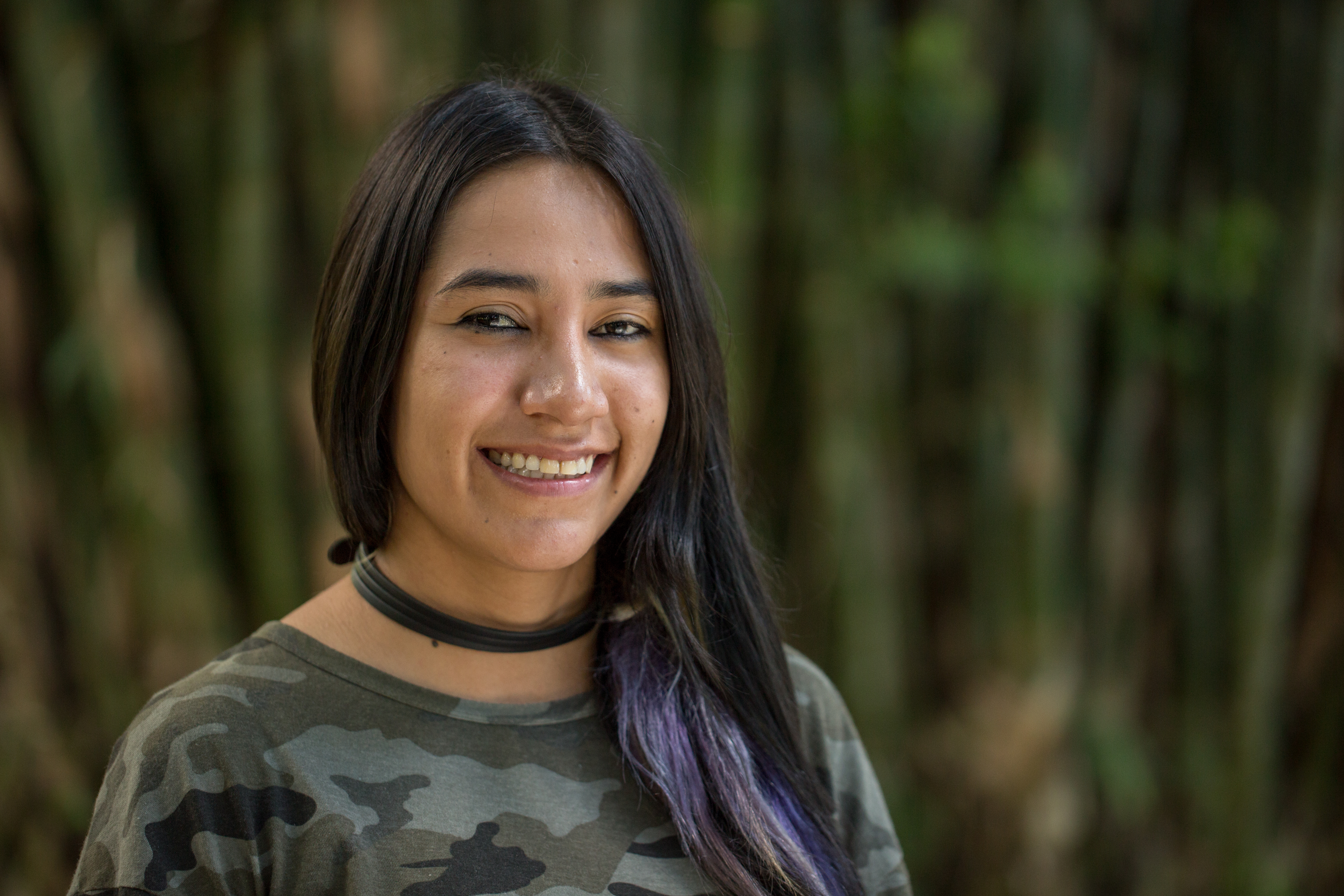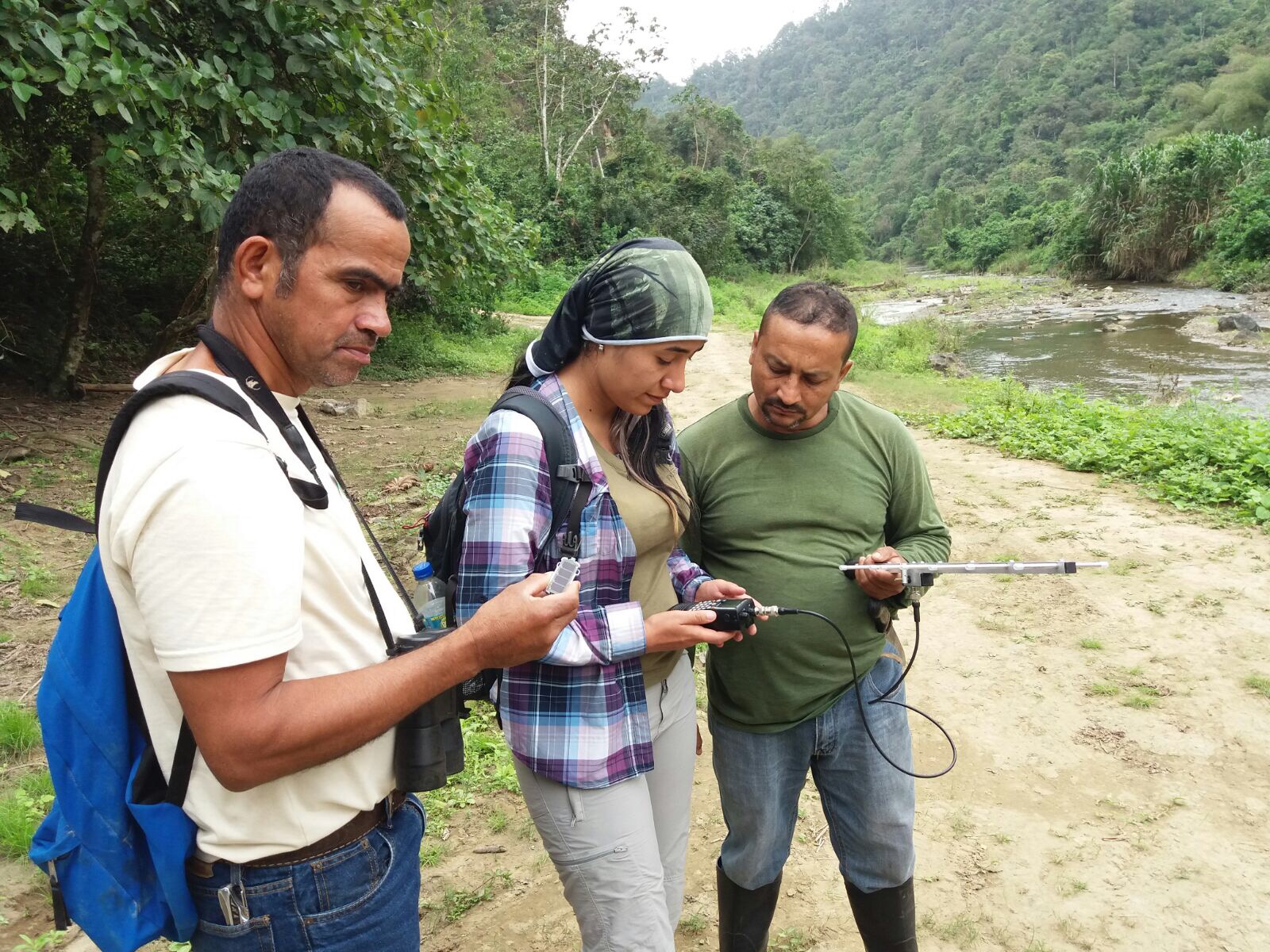Eliana Montenegro is one of our newest Segré EDGE Fellows, who will soon be starting her project focused on the Banded Ground-cuckoo in Ecuador. We asked Eliana to write this blog to introduce herself, her project, and explain what an EDGE Fellowship means to her.
My journey through the bird conservation world
One of the most hardest things for me to do is to write about myself. I have walked many different paths and tried many different activities, from being a heavy metal fan, singer, theatre actress, director (which I gained my bachelors degree in), and finally a biologist. I have been a biologist for four years now, which is a lot longer than my previous professions! The reality is that I have always loved animals and enjoyed nature, it is something that has always been with me.
I wasn’t lucky enough to grow up in a area surrounded by nature, but I was born in Ecuador, one of the most biodiverse countries in the world, where you only need a few hours to get somewhere with a very different ecosystem than where you were before. I was 12 years old when we went on a family trip to Mindo, a very famous place renowned for its biodiversity of birds and orchids. I remember an idea that popped into my mind “I would like to spend my life to walking in the forest”.
My first step into the great world of biology was during a field trip for a zoology class while studying veterinary science at university. I felt an existential dilemma – I left veterinary science and I started a career in cinema (but that’s another story!). At the same time, I couldn’t shake my yearning for the forest so I decided to study biology. It took me 8 years in total to obtain two bachelor degrees; the first in cinema, and the other one in biology.
But how did birds come into my life? Technically they were always there, back since the urban birds I always watched in a park located next to my childhood home. I have always been curious about their behaviour, their songs, and sometimes my mother and I saved fallen nestlings. But I truly entered the world of ornithology when my university adviser asked me to develop my final project focused on the diversity of birds in urban green areas. That project completely changed my life, and now I dedicate my career to birds.

I started working at Fundación Jocotoco two years ago, and thanks to this job I gained a lot of experience from field trips and community relations. I finally understood that without people conservation just isn’t possible. The foundation gave me the opportunity to lead amazing and challenging projects with threatened bird species: nest boxes for El Oro Parakeet (Pyrrhura orcesi), monitoring of the new species the Lilacine Amazon (Amazona lilacina) and the reintroduction of the Great Green Macaw (Ara ambiguus guayaquilensis) in a place where it became extinct more than 50 years ago. The latter is a long-term project working with a highly skilled team and local communities.

Last year I was selected as an EDGE Fellow to work with one of the most endangered and cryptic species of birds, the Banded Ground-Cuckoo (Neomorphus radiolosus). Very little is known about this enigmatic species, its natural history, behaviour and distribution. We have joined forces with another NGO, Fundación de Conservación de los Andes Tropicales. They have great expertise in working with the Banded Ground-Cuckoo – all the latest publications about this species, home range and breeding behaviour was done by them. The bird responds well to the sound of its own call, therefore we use playbacks to detect the presence of the cuckoo. When we find the birds we will define the species occupation and habitat preferences in two private reserves in the Ecuadorian Choco Forest.
My study area is threatened by extractive activities such as logging and palm plantations. These are important economic activities in the area. We will attempt to implement new alternative livelihoods to combat this threat, but this will no doubt be a big challenge. Local people will be trained for the research phase of my project, and we will develop a workshop for birdwatching and to train future local guides for tourists. I am sure that with community involvement we can diminish threats to the region in the long term.
The Banded Ground-cuckoo acts as an umbrella species. Its conservation guarantees the conservation of other threatened and lesser-known species, not only birds. Its protection will also guarantee the preservation of one of the most endangered ecosystems in the world – the Choco forest – for which only 5% of its original extent remains.
As with most of the projects I have been involved in, I expect to learn a lot. Every species I have worked with had a different lesson for me, patience, philanthropy, team work… I can’t wait to see the lesson that the Banded ground-Cuckoo has for me!

Eliana Montenegro is the Project Manager at Jocotoco Foundation (www.jocotoco.org), an Ecuadorian NGO which protects critical habitats for threatened bird species and associated biodiversity. Jocotoco currently manages 13 private reserves, including one in the Galapagos Islands. Eliana is in charge of monitoring activities for threatened birds such as: El Oro Parakeet, Black-breasted Puffleg, Galapagos Petrel and Lilacine Amazon. She also leads a very challenging project to reintroduce Great Green Macaws in an area from which it disappeared more than fifty years ago.
In 2018, Eliana was selected for the EDGE Fellowship Program supported by Zoological Society of London, to start working for the conservation of the Banded-Ground Cuckoo, an enigmatic and threatened bird species that inhabits the Choco Forest. The project is located in the Canande Reserve, one of the last remnants of the Choco Forest in northwest Ecuador, and aims to improve the conservation of the Banded-Ground Cuckoo through increased ecological knowledge and the involvement of local people in conservation actions. This project has the important support of Jordan Karubian, Michaël Moens and Martin Schaefer, prestigious ornithologists who have worked widely with Ecuadorian bird species.
Eliana studied biology, filmmaking, and photography at Universidad San Francisco de Quito. She started her career as a biologist four years ago studying urban birds in Quito-Ecuador. Eliana has given talks in national and international bird conferences about conservation of threatened bird species.
